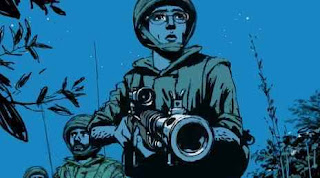 Time Out sketches this capitalism-induced claustrophobia adeptly. Vincent (Aurélien Recoing) is a husband and father of three who loses his job as a mid-level/consulting/ finance/ managerial SomethingOrOther, a job which allowed an upper-middle class lifestyle near France's Swiss border. Instead of facing the matter straight on, he creates a series of stories that eventually grow large enough to dupe his parents, his wife and kids, and his oldest and most treasured friends. The lie at the center of the film swells slowly, quietly; Cantet stirs up suspense with a gentle hand and an ether of anxiety collects and hovers in the fog of the Alps and in the stress-lines on Vincent's face. Knowing the lie cannot last, I racked the Hollywood-schooled side of my brain for too long, trying to figure out what catastrophe, what car-crash/ oil-rig explosion/ murderous rampage might rest in the pit at the bottom of Vincent's slow fall. But, the resulting trauma and punishment from these lies leaves Vincent not mangled on a roadside but quite simply back at work. After the loss of his job conjured such shame, denial, and such a strange kind of retaliation, Vincent signs another contract to let a similar job take hold of his life. And with this, the film's suspense feels strangely satisfied by the most logical, the most realistic of endings: a defeatist jump back into the fire.
Time Out sketches this capitalism-induced claustrophobia adeptly. Vincent (Aurélien Recoing) is a husband and father of three who loses his job as a mid-level/consulting/ finance/ managerial SomethingOrOther, a job which allowed an upper-middle class lifestyle near France's Swiss border. Instead of facing the matter straight on, he creates a series of stories that eventually grow large enough to dupe his parents, his wife and kids, and his oldest and most treasured friends. The lie at the center of the film swells slowly, quietly; Cantet stirs up suspense with a gentle hand and an ether of anxiety collects and hovers in the fog of the Alps and in the stress-lines on Vincent's face. Knowing the lie cannot last, I racked the Hollywood-schooled side of my brain for too long, trying to figure out what catastrophe, what car-crash/ oil-rig explosion/ murderous rampage might rest in the pit at the bottom of Vincent's slow fall. But, the resulting trauma and punishment from these lies leaves Vincent not mangled on a roadside but quite simply back at work. After the loss of his job conjured such shame, denial, and such a strange kind of retaliation, Vincent signs another contract to let a similar job take hold of his life. And with this, the film's suspense feels strangely satisfied by the most logical, the most realistic of endings: a defeatist jump back into the fire. The Class may have a different goal and a different perspective--I'll just have to see it. But, I will be looking (and hoping) for the same approach to folding politics into narrative, one in which the movie breathes the issue at hand but never utters it aloud.
The Class may have a different goal and a different perspective--I'll just have to see it. But, I will be looking (and hoping) for the same approach to folding politics into narrative, one in which the movie breathes the issue at hand but never utters it aloud.For more on The Class, click through to Vadim Rizov's article and Manohla Dargis' article covering its play at NYFF '08. Or, take a look at this list of mostly non-English coverage.





